
Jul 07 2020.
views 1038“In your life’s journey just begin to do the ordinary thing in an extraordinary way and the extraordinary things in your life will simply follow” is a mantra Melanie Kanaka lives by, and throughout her life, she has certainly walked her talk. Kanaka has reached numerous milestones and achieved numerous successes, from holding illustrious posts in the World Bank to being the first Asian woman invited to serve on the CIMA Global Council, and more recently, being appointed Vice President of CIMA Global. In this interview with W@W, Kanaka talks about her career, making history, and more.
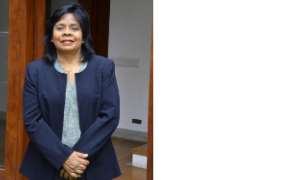
Tell me a little bit about yourself.
I was very fortunate to be born to mixed parents – my father a Sri Lankan Malay and my mother a Sinhalese Christian. I was raised in a home with a Christian setting of mixed culture with an appreciation for diversity and inclusion, along with my elder brother. I was educated in an all-girl School – Bishop’s College. Hailing from a middle-class family, as children, my parents supported us to get involved in diverse activities. I chose to engage in little friends, swimming, drama, religious and literary activities. In whatever we engaged in – we were always encouraged to give it our best efforts – if not chose some things we liked to do.
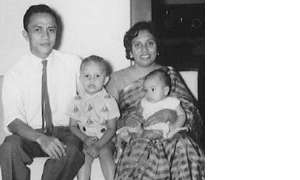
What made you follow this career path? Was there someone who inspired you, or did you have different aspirations as a child?
As a child, I don’t think I had a specific career aspiration – in those days this was not prevalent. Children were children and carefree. I chose this path for I opted to do Commerce, Accountancy, and Econ for my A/L’s and entered the University of Sri Jayewardenepura to read for my B.Com (Hons.) degree. I was one of the Mahapola merit scholars who was given a small grant every month by the government scholarship fund. Needless to mention though small it still was appreciated as we used it for our special treats of a movie and a bite thereafter. Our university academic journey was very disruptive – due to many uncertainties around student unrest and the political uprising, a four-year degree took six years to complete owing to the closing down of the universities on numerous occasions. It was during the wait of a year to enter the university that I started CIMA, just to reap a bit of synergy where the subjects did coincide.
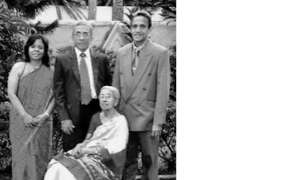
You have reached many milestones, of which one is that you are the first Asian woman invited to serve on CIMA Global Council.
What is special about this milestone is not so much that I am CIMA Global Council’s first Asian lady, but more so that I was co-opted for a second term on Council from outside of the UK. As you may already know I was elected from the South Asia region by the membership initially into an elected position for three years in 2013. Following my first term as an elected member, the Council opted to co-opt me for my second term commencing in 2017. This is perhaps because of the possible potential they saw in me to become a volunteer leader for the profession. This act of co-option only goes to prove that professional bodies like CIMA are devoid of discrimination and will ultimately benefit from their inclusivity and diversity. The rest is history.
You were just appointed VP of CIMA Global, which is a significant achievement.
It's been a long and interesting journey for me over the many years. As I travelled that journey it was never with the intention of seeking any accolades. This was never my dream to lead CIMA in the global arena one day. I enjoyed what I did and being involved in the profession initially on committees locally at the Sri Lanka division and subsequently chairing them and extending my service to the fraternity with a passion beyond Sri Lanka’s shores was what developed me as a person. Volunteer leadership came very much later in my journey and so did my regional and international exposure serving in different capacities at a global level. When you serve unconditionally with a passion, that is when the fraternity begins to respect you and value your contributions.
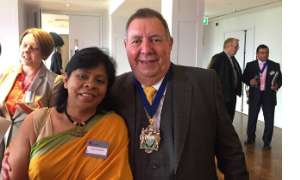
More recently, chairing two of CIMA’s important global policy committees – namely “Membership” and “Professional Standards” Committee were two positions I truly relished and enjoyed. It was where I was able to give something of value back to the profession and to our members. Under my watch as chairman of the Membership Committee, the committee was able to introduce an appeals process for membership. In my immediate past position as Chair of Professional Standards committee, we were able to make significant contributions to the existing CIMA code of Ethics to make it very relevant in current times.
In the context of the COVID – 19 situation and the gradual opening of world economies what is the role that management accountants can play?
Pandemics have disrupted and changed the business world instantly, but this is what Chartered Global Management Accountant (CGMA) designation holders are trained to deal with. The crisis has provided a situation to show how they bring value to organisations and build resilience. The gradual opening of world economies is critical, and we must look at the 4C’s – cash, courage, conviction, and change to move forward. Management accountants, and their ability to connect the dots across these areas, linking strategy with operations and utilizing insights to help business leaders make good business decisions will be crucial. Their core-skills in areas such as cash management, scenario-planning, and evolving business models, will help organisations survive, seize new opportunities, and rebuild the Sri Lankan economy. I know our nearly 5000 members here in Sri Lanka have been very busy and remain in much demand.
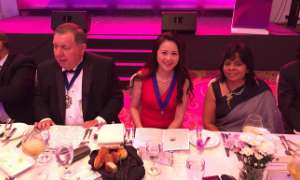
How do you see the Management Accounting profession and the Chartered Institute of Management Accountants making its mark in this turbulent environment?
CIMA has been very active over the last few months supporting members, students, and businesses. We know accounting and finance professionals will play a critical role in rebuilding economies and driving recovery.
As leaders in finance, we have been sharing our expertise through providing free resources and producing tool kits to help not just our members and students, but business leaders too. We recently launched a free Business Resilience Tool Kit that provides advice and practical tools covering scenario planning and adjusting business models. We also have our experts write and share blogs on a range of topics from mental wellbeing and remote working through to getting your finances in order and how to bring your business to recovery out of lockdown.
CIMA also has been educating and transforming our members to become Agile Digital Finance leaders, who can make use of technologies to drive value to their organizations and help them thrive in the new environment. The approach to going digital has also been adopted with our CIMA students too. The closure of test centres in lockdown environments for safety reasons meant we had to rethink our approach to helping students progress towards earning the CGMA designation. In May, just six weeks after most test centres closed, we launched examinations for the CIMA Professional Qualification through online home testing. This has been a resounding success with tests now being carried out in over 80 countries and, with test centres now reopen in many places, a choice for students on where and how they want to take their exams. It will also put our students at an advantage should there be second-wave lockdowns resulting from the COVID-19 virus.
Here in Sri Lanka, we have held over 15 CPDs to help our students, members as well as employees of our Corporate Partners and Top Employers to move ahead in the new norm. Themes covered ranged from Mindfulness to Cash Management as well as Leadership. For our students, we conducted revision as well as exam technique sessions and we also have a free resit provided for all students taking their Objective Test Exams within the Professional Qualification since June.
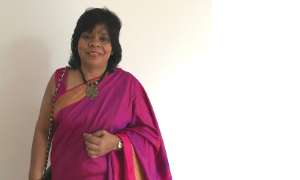
What support has the institution offered its members to enable them to be better equipped to meet unprecedented challenges in the business world and particularly in the light of the recent COVID–19 global pandemic?
We have been active on many fronts, since March when CIMA launched a dedicated resource centre to help members and students with the pandemic. We have now evolved this to help support members in rebuilding business and economic recovery. Some of this I have mentioned earlier.
For many, however, the crisis has had a personal impact. Many people, our members included, have had to deal with unprecedented circumstances and disruption to their working life. For us at CIMA, supporting wellbeing and mental health has been as critically important as helping provide financial tools and resources. Over the last three months, we have shared advice on topics like remote working, mental health, and video conferencing. We have also encouraged members from around the world, including charter holders here in Sri Lanka, to share their personal stories on how they have been coping and any tips and suggestions they may have for others. Going forward, we will continue to support the personal as well as the technical aspects of being a finance professional.
At CIMA we will continue to look to the future and advance the profession. The crisis has accelerated digital transformation and we continue to provide support for our members and students in this area, for example, providing online professional development and access to the latest research reports in fields such as blockchain, cybersecurity, and data analytics. Additionally, we will help with leadership and people skills needed for these new environments and connect fellow professionals both physically (where we can do so safely) and virtually to build their networks, leveraging access to CIMA and the Association of International Certified Professional Accountants network of global 650,000 members and students, the unified voice of CIMA and the American Institute of CPAs.
As a woman, and a Sri Lankan, did you face challenges when climbing the ladder? Did you also have trouble shattering the glass ceiling? Women today still face discrimination in many forms.
Making headway in whatever arena be it academics, sports, or even in the corporate world requires hard work, persistence, and the tenacity to go on despite setbacks. I believe there are no shortcuts to success and the climb up to the top is never easy. You may term it the “glass ceiling”, “discrimination” or whatever. In this journey, I too have had my fair share of setbacks. There will definitely be setbacks in anything one embarks on – be it academics, sports, or in making a successful business, but what is important is to do the right thing, be ethical and principled and press on knowing that the “comeback will always be greater than the setback”.
Work-life balance is another hurdle faced by women. How did you handle this?
Although it is often said that work-life balance is a hurdle faced by women, I believe that work-life balance is not specific to any particular gender. Depending on the circumstances and the complexities of life, this can be a hurdle faced by any gender. My rhetoric on this is that human beings are adaptable personalities and provided they like what they do, they will be able to wade through these hurdles. It is not easy, nor is it a cake-walk. The power of good negotiation comes into use in order to tide over all of these complex situations. Due to their adaptable nature humans usually find a coping or managing strategy that works for them.
What would you say are your greatest achievements to date?
I would say there are three key ones – winning the prestigious Fulbright scholarship, officiating at the Centennial Olympic Games, and of course my recent accolade of being appointed as the Vice President of The Chartered Institute of Management Accountants.
The reasons for each of these differ.
Firstly, the Fulbright scholarship provided me an opportunity to obtain my MBA from one of the top business schools in the US – The Goizuetta Business School of Emory University and this certainly not only broadened my horizon, built international linkages but also opened many doors for me.
Secondly, officiating at the Olympic Games and interacting in the Olympic village among resident athletes and the “creme de la crème” of the sporting world was an invaluable experience. The atmosphere of euphoria, celebrations, and even the disappointments at the end of each Olympic day was a panorama of emotion and an awesome exposure which I will hold dear.
Thirdly, my recent appointment of being elected as the Vice President of an Institute whose fraternity I have served for three decades is indeed a very significant achievement for me. I did not look to this goal but through consistent and focused efforts over many years, the service regionally in Asia and internationally has earned me this position at the recent CIMA AGM. I am indeed humbled by this global appointment.
Through your professional journey, would you credit any mentors and role models who have helped you and supported you along the way?
Not forgetting my dear parents who have now moved on – they were an inspiration and a guiding light who showed me the way in my formative years, teaching me the key principles and the value set that I hold now.
I also consider my principal of many years at Bishop’s College, the late Ms. Amabel Jayasuriya as one of my role models. Such a disciplinarian but a fair and stately lady who was instrumental in mentoring me during my school days at Bishop’s College.
In the Sri Lankan Corporate world, I would rate Mr. Maxi Prelis as my chief mentor – the GM at DFCC Bank where I worked who spotted early talent and encouraged me to apply for the Fulbright scholarship.
In the US, I had the good fortune to be mentored by two solid mentors –the professor of my International perspectives class – Dr. Jeff Rosensweig and my boss at Bellsouth – Carol Warner both of whom believed in me and gave me opportunities of exposure. I cannot pass by not mentioning the then Dean of Admissions of the Business School, the charming Julie Barefoot whose warm welcome and constant encouragement was an added inspiration for me at that time and helped me through the adjustment process into a larger and wider world in the US. They have all in a sizable way contributed to building the foundation and equipping me to step onto the international platform … the journey of which has now begun.
In the CIMA sphere, I would place right on top my mentor and friend of many years – Past President David Stanford who showed me the way forward in this professional journey of volunteer leadership. Needless to mention there have been many past presidents in the global arena who have mentored and provided support throughout this journey of close to three decades.
The doors of the World Bank were opened for me by the then chief administration officer of the South Asia region Honore Ndoko and the country director Peter Harold who were exemplary human beings, visionary personalities, and great motivators of local talent.
Pics by Waruna Wanniarachchi
0 Comments